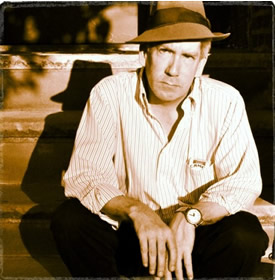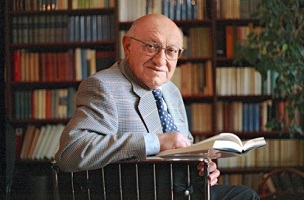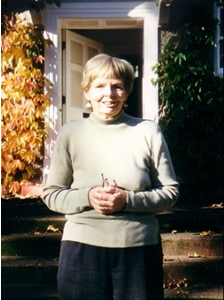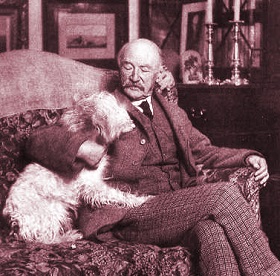|
De Amerikaanse schrijver Jim Knipfel werd geboren op 2 juni 1965 in Green Bay, Wisconsin. Zie ook alle tags voor Jim Knipfel op dit blog.
Uit: Slackjaw: A Memoir
„I didn't have an answer to her question. I had begun to notice that my failing eyesight -- which in the past had affected me only at night -- now was affecting me in the daytime as well. I couldn't cut it in physics, I couldn't cut it at the University of Chicago. So here I was in Madison, at the University of Wisconsin, a nondescript state school that would admit autistics if they could pay the tuition, studying philosophy, which wouldn't do me a damn bit of good in the future. Those facts weren't reasons, either.
"Any possible reasons you could give me?"
I was in it now. I might as well try. "I guess you could say I'm a fuck-up."
"Yeah?" Her voice dropped to a throaty whisper. She must have thought she was getting someplace, that she had finally broken through. "When was the last time you fucked up?"
"About five minutes ago, when I picked up the phone to call you."
"That's not very nice." She was attempting to hold on to her sincerity.
"Sorry," I said. I suppose I was, too, a little.
"Let's try something else. Let's turn things around. Tell me some of the things you like."
I thought for a minute.
"I'm pretty hard-pressed to come up with anything just at this moment, ma'am."
"C'mon, there must be something. You must have friends."
"Nope."
"None at all?"
"Nope"
"What about your family?" "My family's cool. I've got nothing but kind things to say about them."

Jim Knipfel (Green Bay, 2 juni 1965)
De Duitse schrijver en literatuurcriticus Marcel Reich-Ranicki werd geboren op 2 juni 1920 in Włocławek, Polen. Zie ook alle tags voor Marcel Reich-Ranicki op dit blog.
Uit: Deutschlands Glück in Deutschlands Unglück
„Der Schriftsteller Aschenbach habe gelernt, heißt es im "Tod in Venedig", seinen Ruhm zu verwalten. Das trifft, wie wir längst wissen, erst recht auf den Autor dieser Novelle zu. Die jetzt erscheinende "Große kommentierte Frankfurter Ausgabe" bietet in zwei umfangreichen Bänden von den rund 25000 bisher bekannten Briefen Thomas Manns immerhin 691. Sie waren zur Hälfte überhaupt nicht oder nur an schwer zugänglichen Stellen veröffentlicht.
Diese Briefe seien, so ihre Herausgeber, Manns "Medium der Selbstdarstellung und der Selbstfindung". Schon wahr, aber was sich hinter dem Wort "Selbstdarstellung" verbirgt, ist nichts anderes als Selbstreklame, direkte und indirekte. Mit Hilfe seiner Korrespondenz manipulierte und instrumentalisierte er alle, die für seinen Ruhm nützlich sein konnten und sollten. Dafür war ihm niemals seine Zeit zu schade: In diese Tätigkeit investierte er unendlich viel Kraft und Energie, List und Diplomatie. Sie beginnt, wie merkwürdig dies auch klingen mag, noch früher als sein eigentliches Werk.
Schon 1897 nämlich, also bevor sein erstes Buch, "Der kleine Herr Friedemann", publiziert war, bekannte er in einem Brief: "Ich verfalle immer mehr darauf, meinen Schreibtrieb dazu zu verwenden, berühmt zu werden und Geld zu verdienen." Und kurz nach der Veröffentlichung der "Buddenbrooks", im Oktober 1902, hatte er keine Hemmungen zu erklären, ihm komme es darauf an, den Leuten sein Profil einzuprägen, "sodaß, wird der Name genannt, in der Phantasie der Leute sofort eine scharf umrissene geistige Physiognomie hervorspringt". Seine glanzvoll geschriebenen Autoporträts, Lebensabrisse und Rechenschaftsberichte demonstrieren die Kunst der geistreichen Selbstpräsentation auf höchster Ebene.
Die Selbstreklame wurde bald zu Thomas Manns zweitem Beruf. Auch in dieser Hinsicht war er höchst erfolgreich. Denn das Bild, das sich die Menschen von ihm gemacht hatten, entsprach in hohem Maße seinen Wünschen. Und da er der beste Kenner seines Werks war, konnte er in seiner Korrespondenz immer wieder mit Gedanken und Formulierungen aufwarten, die von seinen Interpreten in der ganzen Welt dankbar und meist zu Recht aufgenommen wurden.“

Marcel Reich-Ranicki (2 juni 1920 – 18 september 2013)
De Duitse schrijfster Sibylle Berg werd geboren in Weimar op 2 juni 1962. Zie ook alle tags voor Sibylle Berg op dit blog.
Uit: Das war’s dann wohl
„Spätestens zehn Jahre nach der Adoleszenz bekommen die meisten von uns die Backpfeifen des ungewollten Abschiednehmens um die Ohren gehauen: der erste Job, den man verliert, ohne dass man darum gebeten hätte, die erste Flut, die das Bettchen wegschwemmt, die erste Liebe, die geht, weil sie glaubt, hinter der nächsten Ecke lauere das große Glück. So prügelt einen das Leben langsam zu Boden, und jeder normale Mensch beginnt, Abschiede zu hassen. Alle, selbst die kleinen, wenn das Kind, der Mann, die Frau verreist aus Gründen, und man steht am Bahnsteig und schweigt, und die Minuten werden zäh, und man weiß nichts zu sagen. Vögel fallen zu Boden, und man fragt sich, warum ist mir die Kehle so eng, sind doch nur drei Wochen oder Tage, eine absehbare Zeit. Wir ahnen, jeder kleine Abschied kann einer für immer werden, die Fluglotsen werden es schon richten.
Irgendwann mag man auch keine neuen Gewohnheiten mehr, selbst wenn die alten nicht brillant sind, wenigstens kennt man sie, man kennt seine Vorurteile und seinen Weg ins Büro und den Griff zur Zigarette. Die Abscheu allem gegenüber, was die Gewohnheiten bedrohen könnte, manifestiert sich, und zack, schon hebt man den rechten Arm und findet, dass früher alles besser war. Obacht geben heißt es da, dass man nicht ins Phlegma verfällt, nichts tut, was einem eigentlich verhasst ist, nur weil man Angst vor der Veränderung, Angst vor dem Ende hat. So schwer ist es, eine bekömmliche Mitte zu finden, zwischen stierem Ausharren und hektischer Umtriebigkeit.“
Ständiges Sich-Verabschieden bekommt keinem Menschen. Schau dir die an, die ohne Besitz zwischen den Welten wandern: aussteigen, aber richtig, mal in Asien, dann in Frankreich, und immer neue Freunde — hey, wie locker, und dann sind sie vierzig Jahre alt, sehen aus wie Schrumpfköpfe und knallen sich mit Drogen voll, weil der Geist des Menschen mit zu viel überspielter Trauer nicht klarkommt.“

Sibylle Berg (Weimar, 2 juni 1962)
De Canadese schrijfster Carol Shields werd op 2 juni 1935 in Oak Park, Chicago, geboren als Carol Warner. Zie ook alle tags voor Carol Shields op dit blog.
Uit: Larry’s Party
“By mistake Larry Weller took someone else’s Harris tweed jacket instead of his own, and it wasn't until he jammed his hand in the pocket that he knew something was wrong.
His hand was traveling straight into a silky void. His five fingers pushed down, looking for the balled-up Kleenex from his own familiar worn-out pocket, the nickels and dimes, the ticket receipts from all the movies he and Dorrie had been seeing lately. Also those hard little bits of lint, like meteor grip, that never seem to lose themselves once they've worked into the seams.
This pocket – today’s pocket -- was different. Clean, a slippery valley. The stitches he touched at the bottom weren't his stitches. His fingertips glided now on a sweet little sea of lining. He grabbed for the buttons. Leather, the real thing. And something else -- the sleeves were a good half inch longer than they should have been.
This jacket was twice the value of his own. The texture, the seams. You could see it got sent all the time to the cleaners. Another thing, you could tell by the way the shoulders sprang out that this jacket got parked on a thick wooden hanger at night. Above a row of polished shoes. Refilling its tweedy warp and woof with oxygenated air.
He should have run back to the coffee shop to see if his own jacket was still scrunched there on the back of his chair, but it was already quarter to six, and Dorrie was expecting him at six sharp, and it was rush hour and he wasn't anywhere near the bus stop.
And -- the thought came to him – what’s the point? A jacket’s a jacket. A person who patronized a place like Caf Capri is almost asking to get his jacket copped. This way all that’s happened is a kind of exchange.”

Carol Shields (Chicago, 2 juni 1935 – 16 juli 2003)
De Nederlandse sportjournalist en schrijver Jean Nelissen werd geboren in Geleen op 2 juni 1936. Zie ook alle tags voor Jean Nelissen op dit blog.
Uit: Het intrigerende wielerleven van Jean Nelisse
“In 1969 eindigt de l3e etappe van de Tour de France in Briancon, een stadje van ongeveer 11.000 inwoners in de Alpen.
Er zijn maar een paar hotels van bescheiden kwaliteit.Want dc wintersportliefhebbers die Briancon bezoeken, slapen meestal in chalets. Door een reeks misverstanden heeft de hotelier van het hotel waar we zouden overnachten onze kamer weggegeven. Er bereiken ons uiterst sombere berichten dat in tweehonderd kilometer in de omtrek van de Alpen, geen kamer meer vrij is. Goede raad is duur. lk rijd enkele rondjes door Briancon totdat ik een hotel passeer. waar ik door een grote ruit veel mensen zie. met als stralend middelpunt - zoals altijd Lomme Driessens. Hij logeert met zijn ploeg en kopman
Eddy Merckx die de gele trui draagt in het hotel. We lopen naar binnen en zoeken Lomme op. Hij begroet me vriendschappelijk. ‘Kameraad, hoe is het?‘ lk antwoord: ‘Slecht, Lomme. want we hebben geen kamer om te slapen.’ Lomme zet zijn glas champagne neer en roept de hoteleigenaar. ‘Patron, wilt gij mijn bed op de gang zetten? lk slaap vannacht op de gang, omdat ik mijn kamer zojuist heb weggegeven aan mijn vriend hier.‘ De patron reageert onthutst. Zijn eregast Lomme op de gang. dat kan niet. Hij zegt: ‘Wacht. ik probeer het probleem op te lossen.’ Lomme geeft me een knipoog en schenkt een glas champagne in. Na een kwartier komt de pa-tron terug.‘Het is in orde.‘ zegt hij, ik heb twee kamermeisjes bereid gevonden voor een nacht een kamer te delen.”

Jean Nelissen (2 juni 1936 - 1 september 2010)
De Engels romanschrijver en dichter Thomas Hardy werd op 2 juni 1840 geboren in Higher Bockhampton, bij Dorchester. Zie ook alle tags voor Thomas Hardy op dit blog.
Uit: Tess of the d'Urbervilles
“Daze my eyes, and isn't there?" said Durbeyfield. "And here have I been knocking about, year after year, from pillar to post, as if I was no more than the commonest feller in the parish… And how long hev this news about me been knowed, Pa'son Tringham?"
The clergyman explained that, as far as he was aware, it had quite died out of knowledge, and could hardly be said to be known at all. His own investigations had begun on a day in the preceding spring when, having been engaged in tracing the vicissitudes of the d'Urberville family, he had observed Durbeyfield's name on his waggon, and had thereupon been led to make inquiries about his father and grandfather till he had no doubt on the subject.
"At first I resolved not to disturb you with such a useless piece of information," said he. "However, our impulses are too strong for our judgement sometimes. I thought you might perhaps know something of it all the while."
"Well, I have heard once or twice, 'tis true, that my family had seen better days afore they came to Blackmoor. But I took no notice o't, thinking it to mean that we had once kept two horses where we now keep only one. I've got a wold silver spoon, and a wold graven seal at home, too; but, Lord, what's a spoon and seal? … And to think that I and these noble d'Urbervilles were one flesh all the time. 'Twas said that my gr't-granfer had secrets, and didn't care to talk of where he came from… And where do we raise our smoke, now, parson, if I may make so bold; I mean, where do we d'Urbervilles live?"
"You don't live anywhere. You are extinct—as a county family."
"That's bad."
"Yes—what the mendacious family chronicles call extinct in the male line—that is, gone down—gone under."
"Then where do we lie?"
"At Kingsbere-sub-Greenhill: rows and rows of you in your vaults, with your effigies under Purbeck-marble canopies."

Thomas Hardy (2 juni 1840 – 11 januari 1928)
De Franse schrijver Donatien Alphonse François, Markies de Sade werd geboren op 2 juni 1740 in Parijs. Zie ook alle tags voor Markies de Sade op dit blog.
Uit: Justine (Vertaald door Austryn Wainhouse)
"Oh, Monsieur!"
"No, no, you've got to die; I do not want to hear you reproach me with your good little deeds; I don't like owing anything to anybody, others have got to rely upon me for everything.... You're going to perish, I tell you, get into that coffin, let's see if it fits."
He lifts me, thrusts me into it and shuts it, then quits the cavern and gives me the impression I have been left there. Never had I thought myself so near to death; alas! it was nonetheless to be presented to me under a yet more real aspect. Roland returns, he fetches me out of the coffin.
"You'll be well off in there," says he, "one would say 'twas made for you; but to let you finish peacefully in that box would be a death too sweet; I'm going to expose you to one of a different variety which, all the same, will have its agreeable qualities; so implore your God, whore, pray to him to come posthaste and avenge you if h really has it in him...."
I cast myself down upon the prie-dieu, and while aloud I open my heart to the Eternal, Roland in a still crueler manner intensifies, upon the hindquarters I expose to him, his vexations and his torments; with all his strength he flogs those parts with a steel-tipped martinet, each blow draws a gush of blood which springs to the walls.
"Why," he continued with a curse, "he doesn't much aid you, your God, does he? and thus he allows unhappy virtue to suffer, he abandons it to villainy's hands; ah! what a bloody fine God you've got there, Therese, what a superb God he is! Come," he says, "come here, whore, your prayer should be done," and at the same time he places me upon the divan at the back of that cell; "I told you Therese, you have got to die!"

Markies De Sade (2 juni 1740 – 2 december 1814)
Klaus Kinski als de markies in de Duits-Italiaanse film „Marquis de Sade: Justin“ uit 1969
Zie voor nog meer schrijvers van de 2e juni ook mijn blog van 2 juni 2013 deel 2.
02-06-2015 om 18:02
geschreven door Romenu 
Tags:Jim Knipfel, Marcel Reich-Ranicki, Sibylle Berg, Carol Shields, Jean Nelissen, Thomas Hardy, Markies De Sade
|

